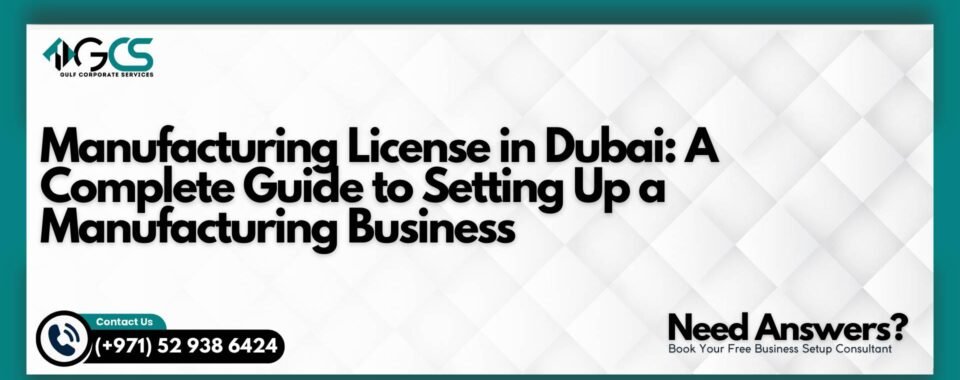
Table of Contents
- Introduction
- Why Choose Dubai for Manufacturing?
- Overview of a Manufacturing License in Dubai
- Types of Manufacturing Licenses in Dubai
- General Manufacturing License
- Specialized Manufacturing License
- Steps to Obtain a Manufacturing License in Dubai
- Eligibility Criteria
- Selecting the Right Jurisdiction
- Reserving a Trade Name
- Required Documentation
- Approvals and Final Licensing
- Related Licenses for Manufacturers
- Import/Export License
- Warehousing License
- Packaging Services License
- Compliance with Legal and Regulatory Standards
- Dubai Municipality Approval
- Environmental Regulations
- Health and Safety Standards
- Costs Associated with a Manufacturing License
- Benefits of Having a Manufacturing License in Dubai
- Conclusion
1. Introduction
Dubai has emerged as a leading hub for manufacturing due to its strategic location, world-class infrastructure, and supportive business environment. Whether you are looking to manufacture consumer goods, industrial equipment, or innovative technologies, setting up a manufacturing unit in Dubai offers vast opportunities for growth and expansion.
To start manufacturing in Dubai, you will need to obtain a Manufacturing License. This guide provides a detailed overview of the process, costs, and benefits of obtaining this license, helping you successfully establish your manufacturing business.
2. Why Choose Dubai for Manufacturing?
Dubai is an ideal destination for manufacturers for several reasons:
- Strategic Location: Dubai connects markets in the Middle East, Africa, Asia, and Europe, offering easy access to global trade routes.
- Advanced Infrastructure: The city offers excellent logistics, ports, and transportation facilities, facilitating smooth operations for manufacturers.
- Tax Benefits: Manufacturers benefit from 0% corporate and personal income tax and other financial incentives in free zones.
- Supportive Government Policies: The Dubai government actively promotes industrial development through various initiatives aimed at boosting local and foreign investment in the manufacturing sector.
3. Overview of a Manufacturing License in Dubai
A Manufacturing License is essential for any company planning to produce goods or products in Dubai. It is issued by the Dubai Department of Economic Development (DED) or free zone authorities depending on the location of the business. The license allows businesses to legally engage in manufacturing activities, including the production, processing, and assembly of goods.
Manufacturing licenses vary depending on the nature of production, materials used, and industry regulations. It’s crucial to determine which category of manufacturing best fits your business model.
4. Types of Manufacturing Licenses in Dubai
Manufacturing businesses in Dubai may require different types of licenses depending on the products they manufacture. The two primary categories are:
General Manufacturing License
This type of license covers a wide range of manufacturing activities, including:
- Consumer goods (e.g., food, beverages, and textiles)
- Industrial goods (e.g., machinery, tools, and construction materials)
- Electronics, plastics, and packaging
This is the most common manufacturing license and provides flexibility to produce various goods under one license.
Specialized Manufacturing License
A Specialized Manufacturing License is required for businesses engaged in the production of regulated or high-risk products, such as:
- Pharmaceuticals and medical devices
- Chemicals and hazardous materials
- Automotive parts or heavy machinery
Specialized licenses often come with additional regulatory approvals to ensure the safety and compliance of the manufacturing process.
5. Steps to Obtain a Manufacturing License in Dubai
Step 1: Eligibility Criteria
To qualify for a manufacturing license, businesses must meet specific requirements, including:
- Professional Experience: Having prior experience in the manufacturing industry, especially for specialized manufacturing, is beneficial.
- Capital Requirements: Manufacturing businesses generally require higher initial capital investments due to machinery, facilities, and operational costs.
Step 2: Selecting the Right Jurisdiction
Businesses can choose between establishing their manufacturing operations in the mainland or a free zone.
- Mainland:Setting up a manufacturing business in mainland Dubai offers significant advantages, including access to a diverse market, robust infrastructure, and the ability to trade freely within the UAE and internationally. To start, you’ll need to obtain a Manufacturing License in Dubai from the Department of Economic Development (DED). This process involves submitting a detailed business plan, securing approvals from relevant government entities such as Dubai Municipality and the Ministry of Health (depending on the nature of the business), and complying with environmental and safety regulations. Mainland companies also have the flexibility to operate anywhere in the UAE without restrictions, making it easier to access local and regional markets. Additionally, manufacturers benefit from Dubai’s strategic location, advanced logistics networks, and government incentives aimed at fostering industrial growth. Once all approvals are secured, the business can begin operations, positioning itself for success in one of the world’s fastest-growing industrial hubs.
- Free Zones: Setting up a manufacturing business in one of Dubai’s free zones offers several unique advantages, making it a popular choice for foreign investors. Free zones in Dubai, such as Dubai Industrial City or Jebel Ali Free Zone (JAFZA), are specialized economic areas designed to promote specific industries, including manufacturing. A Manufacturing License in Dubai for a free zone allows businesses to benefit from 100% foreign ownership, tax exemptions (corporate and income), full repatriation of profits, and streamlined customs procedures. These zones also provide access to state-of-the-art infrastructure, warehousing, and logistics facilities, making them ideal for manufacturers:
- Dubai Industrial City (DIC)
- Jebel Ali Free Zone Authority (JAFZA)
- Dubai South Free Zone
Step 3: Reserving a Trade Name
Choose a trade name that reflects the nature of your manufacturing business and ensures compliance with Dubai naming regulations. The name must be unique and not infringe on existing trademarks.
Step 4: Required Documentation
To apply for a manufacturing license, the following documents are typically required:
- Passport copies: For all shareholders and managers.
- Proof of capital: Evidence of your ability to meet the capital requirements for setting up a manufacturing business.
- Business plan: A detailed business plan, including your manufacturing processes, equipment, and facilities.
- NOC (No Objection Certificate): If you’re a UAE resident with an existing employment visa, you will need an NOC from your employer.
- Lease agreement: A contract for the premises where manufacturing will take place.
Step 5: Approvals and Final Licensing
- Dubai Municipality Approval: Required for businesses involved in food production, chemicals, or any product impacting public health.
- Environmental and Safety Approvals: Depending on the nature of your manufacturing, additional approvals may be needed to ensure compliance with UAE environmental and safety laws.
- License Issuance: Once all approvals are in place, you can pay the required fees and receive your manufacturing license.
Read More:Dubai South Free Zone Licenses, Advantages & License Cost
6. Related Licenses for Manufacturers
Several licenses complement the Manufacturing License, depending on the scope of your operations:
Import/Export License
Manufacturers often need to import raw materials and export finished products. An Import/Export License is essential for conducting cross-border trade activities.
Warehousing License
Manufacturers require large storage facilities to stock raw materials and finished goods. A Warehousing License permits businesses to operate dedicated warehousing spaces.
Packaging Services License
If you provide packaging as part of your manufacturing process, a Packaging Services License is required. This license covers the production of packaging materials and services like labeling, wrapping, and sealing.
7. Compliance with Legal and Regulatory Standards
Dubai Municipality Approval
The Dubai Municipality plays a key role in approving manufacturing activities, especially for businesses dealing with food, beverages, or chemicals. Your facilities must meet their strict health and safety standards.
Environmental Regulations
Manufacturers are required to comply with Dubai’s environmental laws, including waste management, pollution control, and energy efficiency. Manufacturing businesses in industries such as chemicals or heavy equipment may require additional approvals from the Ministry of Climate Change and Environment.
Health and Safety Standards
Manufacturers must ensure that their factories and production units comply with UAE health and safety laws. This includes regular inspections, fire safety protocols, and worker safety training.
8. Costs Associated with a Manufacturing License
The cost of obtaining a manufacturing license depends on various factors, including the scale of your operations, the location of your business, and the type of products you manufacture.
- License Fees: AED 15,000 – AED 30,000
- Facility Rent: AED 100,000 – AED 500,000 annually, depending on the size and location of the factory or production unit
- Equipment Costs: Varies depending on the type of machinery required for manufacturing
- Visa Costs: AED 3,000 – AED 5,000 per employee
- Environmental and Health Approvals: Additional fees may apply based on the nature of manufacturing
9. Benefits of Having a Manufacturing License in Dubai
- Strategic Global Access: Dubai’s connectivity to global markets makes it easier for manufacturers to distribute products internationally.
- Tax Incentives: Free zones offer 100% repatriation of profits and exemption from import/export duties.
- Advanced Infrastructure: Dubai offers world-class industrial facilities, modern ports, and an efficient logistics network, making it ideal for manufacturing businesses.
- Diverse Market: Dubai’s multicultural environment provides access to diverse consumer bases, both locally and internationally.
10. Conclusion
Obtaining a Manufacturing License in Dubai is the gateway to tapping into the region’s thriving industrial sector. From food production to heavy machinery, Dubai offers endless opportunities for manufacturers looking to establish a global presence. By ensuring compliance with regulatory standards and leveraging Dubai’s infrastructure, your manufacturing business can thrive in this competitive market.
Our team of experts can guide you through the entire licensing process, ensuring that your manufacturing venture is established smoothly and efficiently.
Read More:Dubai South Free Zone Licenses, Advantages & License Cost








